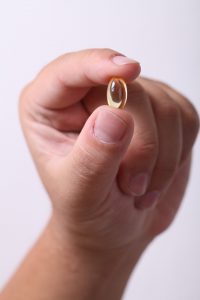What’s on your list of things that are vital to your health? Exercising? Eating right? Getting enough sleep? How about taking your daily vitamins or supplements? According to a recent poll, a whopping 86% of Americans say that they take vitamins or supplements – that’s more than 4 out of 5 of us. Yet the same study shows that only 24% of those people actually have any kind of nutritional deficiency that would require them to take dietary supplements. Another study has found that we spend more than $12 billion a year on vitamins and supplements! It might be time to re-examine why you’re taking vitamins and supplements and whether they’re actually doing anything positive for your health. At best, some could be useless and a waste of money; at worst, some could actually be harming you.
Multivitamins

If you’re going to find one type of vitamin in someone’s cupboard, it’s probably going to be a multivitamin. These pills have been touted as a necessity for everyone, claiming to pump you full of all the vitamins that your body needs, and that you’re probably lacking in. The truth is, though, that you’re probably not lacking in these nutrients. Most of us get all the vitamins that we need, like C, A, and B, from the foods that we eat.
Beyond the very doubtful necessity of taking a multivitamin, there might be even bigger drawbacks to these little pills or gummies. While many studies on them have produced mixed results, with some claiming slight benefits and others showing no benefits at all, some studies have actually found an increased risk of mortality and cancers in people who regularly take multivitamins. In addition, people who consume normal amounts of things like vitamin A and iron in their diets should be careful with supplements: too much of these things can be toxic.
Vitamin D
This is one vitamin that is difficult to get from foods. We also get it from sunlight, but because of where many of us live, or the lifestyles we lead, it can be difficult to get enough that way, as well. Because vitamin D is necessary for strong bones, teeth, and muscles, and because recent studies suggest that it may help fight off infections, you should consider talking to your doctor about adding this supplement into your routine.

Vitamin C
File this one under: complete waste of money. In the 1970s, chemist Linus Pauling suggested that vitamin C could help fight colds, and the idea stuck, eventually spawning a whole industry of “immune-boosting” products containing vitamin C. But study after study has found no evidence that taking vitamin C supplements helps with, well, anything. Eat your strawberries instead!
Zinc
So it turns out that taking extra vitamin C is pretty useless (you’ll just end up peeing out the excess, which could even lead to painful kidney stones), but zinc might actually be the one thing that can help you if you’ve got the sniffles. Studies have found that this mineral interferes with the replication of rhinoviruses, the bugs that cause the common cold. In fact, one recent study compared people sick with colds who were taking zinc versus those who were taking a placebo, and did find that the ones taking zinc experienced less severe symptoms and recovered more quickly than those taking the placebo.
Vitamin E
Vitamin E protects our body from free radicals and boosts our immunity, and for a while, many people were excited by the idea that taking it as a supplement could help ward off everything from cancer to heart disease. But the results of studies have been mixed at best, and the current recommendation is that healthy people should not be taking a vitamin E supplement. 
Like vitamin A (which can be toxic in large amounts), and unlike vitamin C (which is water soluble) vitamin E is fat soluble, meaning it will be absorbed and stored by your body, so large amounts of it can build up. And high doses of vitamin E have been linked to an increased risk of bleeding, stroke, and even certain cancers, like prostate cancer. So skip the supplement and dive into some leafy greens instead! Don’t like getting your Popeye on? Then all you need to do is eat a handful of sunflower seeds and you’re good to go.
Folic Acid
The answer to whether you should be taking folic acid really depends on who you are. This supplement is important for pregnant women or women who want to get pregnant; in fact, the National Institutes of Health recommends that these women take 400 micrograms of this nutrient daily to support their bodies’ as they carry a growing fetus. In addition, several large studies have suggested that taking folic acid during pregnancy helps reduce the risk of neural-tube defects, and serious, life-threatening birth defects of the baby’s brain, spine, or spinal cord.
Probiotics
These bacterial supplements might be the priciest pills on the list: they can cost upwards of $1 per pill, and their wild popularity with people looking to support their gut health has spawned a $23 billion dollar industry. So are they worth the cost and the hype? For now, we’re going to have to say no. For one thing, there just hasn’t been enough promising research that suggests they actually do anything positive for everyone who takes them. As Carrie Daniel-MacDougall, Ph.D., M.P.H., a nutritional epidemiologist, points out, the same issue with most supplements applies to probiotics, as well: “More research needs to be done on probiotics in general and probiotic supplements, but it’s always better to get your nutrients from food rather than supplements. They just don’t deliver the same benefits as food.”

Daniel-MacDougall also points out that there’s a chance probiotic supplements could have a negative affect on your body. “Maybe a probiotic supplement will have a positive effect on your digestive system if you’re lucky, but it’s likely it will have no effect,” Daniel-MacDougall says. “And it could even disrupt or displace some of the good bacteria you already have.” These pills could disrupt the delicate and very personal balance of bacteria in your gut and you could end up with chronic stomach aches or problems with digestion and bloating as your body struggles to adjust. Our suggestion? Stick with plain yogurt (regular or Greek, jazzed up with fruit or honey if you don’t like it plain), or, if you’re into them, fermented foods like sauerkraut or kimchi.
When it comes down to it, with a few exceptions like zinc, vitamin D, and folic acid, which can be used in specific ways for specific people, most vitamins and supplements don’t seem to be worth the money we’re spending on them. There just aren’t studies that consistently prove that they live up to their hype, and there are even some studies suggesting that some could be harmful. Vitamins and supplements can also vary wildly in their quality and ingredients, since they aren’t as closely regulated as food and medications. Your best bet is to stick with eating a balanced diet so that you can be sure you’re getting all the nutrients you need – in their purest and most potent form! Oh, and don’t forget the exercising and getting enough sleep part! Too bad they can’t put those in a bottle…

